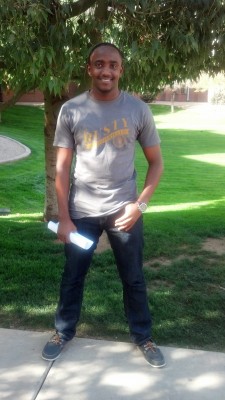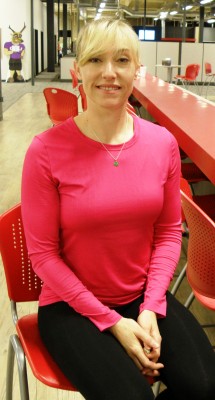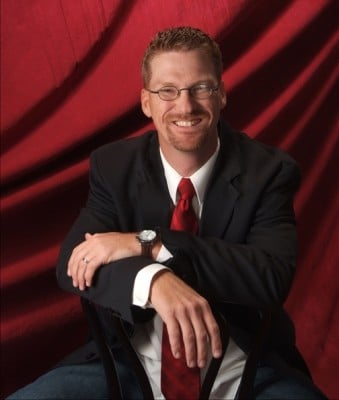By Rick Vacek
GCU News Bureau
The five finalists in the 2014 Canyon Challenge couldn’t be much more different. Bows for cheerleaders … drones for real estate … faith-based food/fitness coaching … aid for nursing students … help for home schoolers.
But all have one thing in common: They already have set in motion businesses that are as creative as they are unusual.
The competition, patterned after the ABC-TV show "Shark Tank," is scheduled to begin at 1 p.m. Thursday at First Southern Baptist Church, adjacent to campus. Faculty, staff and students are invited to attend and cheer on their favorites, who will be trying to win $7,000 for first place, $2,000 for second and $1,000 for third. Each finalist will have 10 minutes to speak and five minutes to answer questions from judges.
Those judges are: Brian Mueller, GCU’s president and CEO; Dr. Ken Blanchard, the servant-leadership guru whose name is on the University’s business school; Alan Lobock, co-founder of SkyMall; Sheldon Harris, former president of the Cold Stone Creamery franchise; and restaurateur Lauren Bailey of Postino’s.
Here’s an inside look at the five finalists in alphabetical order, from the conception of an idea to the birth of a business plan:
CRAZY CHEER MOM
Ginger Dorsett is used to people being amazed that there could even be a market for cheerleaders’ hair bows. After she posted her original executive plan for the Canyon Challenge, another contestant messaged her to express disbelief that All-Star cheerleading competition even existed, let alone that there is a need for stronger, more high quality and more inexpensive bows.
“There is a big need for it in the cheer industry,” said Dorsett, noting that some bows are off-center, some pull apart too easily and some have embellishments, such as rhinestones, that fall off too easily.
Dorsett, an online student in the master’s program for nursing education who lives in Lake Havasu City, compares the cost of All-Star cheerleading to hockey – she estimates that the average participant spends $350 just for the uniform and up to $35 for the bow. With travel and other expenses, the average cost per year is $4,000, according to Dorsett’s business plan.
“It’s extremely expensive,” Dorsett said. “And then you throw the bow on top of it and it’s absolutely insane.”
Because bows can get stepped on during routines and sometimes aren’t well constructed, they can quickly fray or fall apart. Dorsett says she uses stronger material and takes extra care to make sure her bows are sturdy, and she keeps her price at $16 to $18 unless it’s a custom order. “I won’t charge more,” she said. “Ethically, I can’t do it.”
Dorsett said that she will replace her bows at no cost to the customer but has never been asked to do so.
All-Star cheerleading is similar to traveling baseball teams. It’s one step beyond typical cheerleading for a school, and Dorsett said the emphasis is on the athleticism of the entire team – a combination of gymnastics, dance and cheerleading. Competitions take place across the country from November to April.
Dorsett’s 12-year-old daughter, Patience, started All-Star cheerleading three years ago, and after seeing the bows girls were wearing, Ginger decided she could do better. “I didn’t have any business experience,” she said. “Everything I did, I learned by doing.”
What an interesting name: Patience. Ginger laughed and added without being asked, “She doesn’t have any.”
DELUXE SKY PRODUCTIONS
For years, we’ve heard about the use of drones for military purposes. Now they’ve also gone domestic and are being used for monetary purposes – and we’re talking big monetary purposes.
With Deluxe Sky Productions, Lemmy Gitahi is using drones to build a business in the luxury real-estate market. He already has 10 clients and is bringing with him the know-how that comes with being a licensed pilot at age 16.
“This industry, it’s the next big bubble,” said Gitahi, a native of Nairobi, Kenya. “It’s about looking ahead, innovations. If I was a rich businessman, looking to buy a $20 million home, where would I go? I would go online. And most of the quality of the real-estate photos you see online is very poor.”
Gitahi, who majors in forensic science and minors in entrepreneurial studies, was inspired to fly by his father, Joe, who flies helicopters. Lemmy said that when he came to GCU he wanted to buy a small, remote-controlled plane just for fun, then “stumbled across the technology” of the drone and quickly saw its potential. “The list of applications is endless,” he said.
He intended to try to build a drone business in Africa before he mentioned it to Tim Kelley, associate professor in the Ken Blanchard College of Business and the organizer of the Canyon Challenge. Kelley liked the idea so much that he urged Gitahi to enter the competition.
Gitahi said a low-quality drone can be purchased for less than $1,000, but good ones – which can accommodate larger cameras and GPS systems – cost from $15,000 to $25,000. By contrast, a quick check of helicopters for sale showed a minimum price of $170,000 and a maximum of $14 million.
His business plan is to charge $4,995 for crisp videos and photos shot by cinematic cameras, and it takes only two people to operate the equipment. Renting a helicopter for that kind of production would cost as much as $15,000 for just one day. He said most drones these days operate on batteries, but gas-operated drones are available as well.
Don’t think luxury real estate is the only high-end sector Gitahi has targeted. He also intends to start a luxury jet company someday. Talk about sky-high aspirations …
iSTUDENTNURSE
Like the other Canyon Challenge finalists, Rebecca McLarkey has been just a wee bit busy in the last year.
“I haven’t really had much of a life,” she said. “A lot of my friends think I’ve died.”
McLarkey, scheduled to graduate with her nursing degree next month, knew nothing of GCU's IDEA program when she got an email announcing it weeks before the deadline for the 2013 contest, and she didn’t have time to put her newly conceived iStudentNurse program into a business plan. She targeted this year’s competition instead and already has a fully functional website, www.iStudentNurse.com, that includes 600 pages of research, tons of market research and vendor agreements.
The idea was born after McLarkey cruised into GCU with a 4.0 GPA. “I thought nursing school would be a breeze,” she said. “Instead, I got a culture shock. I saw a lot of students fail out.” Her frustration boiled over when an instructor told students to purchase four guidebooks for nursing but wasn’t specific about what exactly to get. “I searched and searched, and there was no one place to get all of them,” she said. “Some students bought the wrong thing. I thought there must be one online store that had all of them, but in reality it didn’t exist.”
So McLarkey and two other GCU nursing students, Tonya Smith and Anna Bright, got to talking about the challenges facing nursing students – higher costs, high attrition rates, the lack of clear, concise and reliable information – and decided to try to become a one-stop shop. Nursing has evolved so much in the last decade, mainly because of changes in technology, but the technology that explains it all hasn’t kept pace, in McLarkey’s view.
Why is that? “A lot of doctors and nurses don’t know computers,” she said. “And IT people don’t know nursing.”
McLarkey said she has been able to press on, thanks to the support of her classmates, instructors, professors and even past professors, but the website goes well beyond personal experiences. Mostly through Pinterest, the site is backed up by market research that shows, for example, which type of nursing shoe generates the most likes. It makes money by selling products for vendors.
McLarkey has used her site to her own benefit, too – it has been a reference guide for her. But, she said, “This isn’t iStudentRebecca. This is for everyone.”
KATE AND ALI’S FAITH FOOD FITNESS
Katie Leiler said she learned a lot from finishing second in last year’s Canyon Challenge with her “Food With Purpose” entry. But she has learned even more from her experiences as a personal trainer and fitness enthusiast and as someone who battles food allergies, and now she’s back among the finalists with a unique idea that goes two steps beyond her previous entry.
“I learned last year that, in order to succeed, you have to take a risk. My confidence level skyrocketed after that,” said Leiler, scheduled to receive her bachelor’s degrees from GCU this spring in entrepreneurial studies and in exercise science with an emphasis in health education. “Overall, it was an awesome experience, partly because I overcame my fear of public speaking. It’s probably one of the coolest experiences I’ve ever had.”
Leiler, who spent six years in the Air Force and was certified as a fitness specialist, doesn’t sound as if she fears anything as she talks about Kate and Ali’s. (She included her best friend, Alison Graulich, in the name because she has had a lot of input into Leiler’s ideas, but Graulich is not involved in the business plan.) Katie envisions it as a partnership with her church, Christ’s Church of the Valley in Peoria, which attracts more than 19,000 people to its five services every weekend. “I figured it would be a prime candidate to penetrate because they’re so huge,” she said.
She has had preliminary discussions with church officials and ultimately hopes to build a health club near -- or even at -- CCV that would be like no other in multiple ways: always playing contemporary Christian music, serving healthful food made with no white flour or white sugar, and offering free one-hour, once-a-month sessions in nutritional advice, Christian counseling and life coaching.
Leiler already has the food option in motion. Working with a company in China, she has drawn up plans for a kiosk-on-wheels that she hopes to station in GCU Arena when its renovation is completed. The kiosk, which would be a partnership with several health-food companies, would be open daily. “I’ve received a lot of positive feedback from people on campus who want something healthy,” she said, noting that the military could benefit as well (no surprise to anyone who has eaten at a mess hall).
Leiler’s post-graduation plans might depend on what happens Thursday. She’s toying with the idea of getting her master’s, but she also knows that starting a business of the magnitude of a health club is no small task. Either way, she’ll be doing what she loves. She has her personal trainer certification from the prestigious National Academy of Sports Medicine (NASM), so this is in her blood.
“I have a passion for helping people achieve their health and fitness goals,” she said.
M POWER LEARNING GROUP
Joshua Christensen will never forget that September night in 2006 when he was jarred awake at 2:30 a.m.
“I sat up in bed, and it was crystal clear that my mission was fiscal stewardship,” he said.
Since then, he has felt God’s hand many times in the evolution of M Power Learning Group. The aim is to provide financial literacy for families of children who are home-schooled through quality and affordable courses, products and content.
“I really and truly believe this is a mission God has called me on,” he said. “It feels like every step we take is in the dark, and God keeps providing new flashlights for us.”
Christensen calls the home-school market “quirky” and “somewhat secretive,” which is why outside companies have had trouble infiltrating it, in his view. Christensen and his business partner, David Libby, both are parents of children who are home-schooled, although Christensen’s wife, Belinda, handles most of the teaching in their house.
Christensen, who has been in the financial industry for 18 years, said he lost his house, 15 years of savings and three-quarters of his salary in the 2008 stock market collapse. A year later, he was “wrestling with God about whether I should go forward with this” when he heard this message in his prayers: “You need to rewrite your work because my people are hurting, and they need to talk to someone who has gone before them.”
So the business partners turned a financial-planning book Christensen had written, “Consider the Ant,” and turned it into another book, “The Money Book for Teens,” as well as a six-part DVD series. Now they are focused on partnering with other families who have created home-school products but don’t have a viable platform. They also hope to get other companies to link back to their website, www.proverbs66.com. (Proverbs 6:6 reads, “Go to the ant, you sluggard; consider its ways and be wise!”)
Christensen, an online student who lives in Albuquerque, has found time to do all this while continuing his work toward a bachelor’s degree in entrepreneurial studies. He hopes to graduate next year and is considering going on to get a master’s.
“It’s pretty amazing what God has allowed us to do with no money,” he said. “We know He’s endorsed it.”
Contact Rick Vacek at 639.8203 or [email protected].








































































